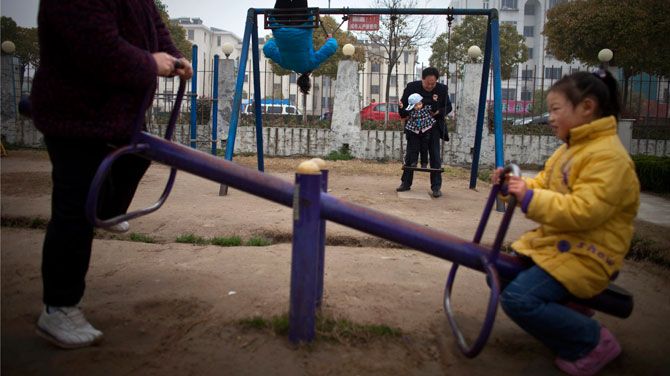- California Assembly OKs highest minimum wage in nation
- S. Korea unveils first graphic cigarette warnings
- US joins with South Korea, Japan in bid to deter North Korea
- LPGA golfer Chun In-gee finally back in action
- S. Korea won’t be top seed in final World Cup qualification round
- US men’s soccer misses 2nd straight Olympics
- US back on track in qualifying with 4-0 win over Guatemala
- High-intensity workout injuries spawn cottage industry
- CDC expands range of Zika mosquitoes into parts of Northeast
- Who knew? ‘The Walking Dead’ is helping families connect
China to end one-child policy, boon to couples, companies

In this April 5, 2010 file hoto, Chinese grandparents and grandchildren play in a park in Dafeng, in east China’s Jiangsu province. China’s ruling Communist Party announced Thursday, Oct. 29, 2015, that it will abolish the country’s decades-old one-child policy and allow all couples to have two children, removing remaining restrictions that limited many urban couples to only one, the official Xinhua News Agency said. (AP Photo/Alexander F. Yuan, file)
BEIJING (AP) — China’s decision to abolish its one-child policy is a boon not only to couples but to sellers of goods from formula to diapers to toys. And it might help to defuse economic stresses caused by an aging population.
The impact of the surprise change announced Thursday is expected to be gradual. But with incomes rising in the world’s most populous country, even a small uptick in births could translate to higher demand from Chinese that ripples around the world.
The decision to allow all married couples to have two children, ending a policy that limited many urban families to one, coincides with official efforts to encourage economic growth based on consumer spending.
Wei Guang, the father of an 8-year-old son, said he and his wife already were considering whether to have a second child, even though the cost was daunting. Wei said food, clothes, nannies, after-school lessons and other expenses can cost 100,000 yuan ($16,000) a year.
“We know the cost will be substantial,” said Wei, 51, who works in media and whose wife is in her 30s. “But we can manage.”
Citigroup researchers said they expected a 5 to 10 percent rise in Chinese births.
The birth limits enacted in 1979 dramatically changed the status of children in Chinese society. Even families with modest incomes lavish money on their “little emperors,” paying for dance, music and English classes.
Su Weihua, the mother of an 8-year-old daughter in the southern city of in Guangzhou, said she was making plans to get pregnant next year. She already was thinking about how to pay for a second child.
“I think we may spend less on things like traveling, luxury goods, expensive new phones or a bigger house,” said Su, 36.
A string of Chinese product safety scandals has helped to boost demand for imported milk, food and baby care products, allowing foreign brands to charge premium prices.
On Thursday, shares in Mead Johnson Nutrition Co., the maker of Enfamil formula, briefly spiked to a two-month high in New York.
The one-child policy was imposed to conserve resources. The ruling Communist Party has said it led to 400 million fewer births. But that also caused China’s average age to soar, leading to concern about whether the shrinking workforce could support a growing pool of retirees.
China already had one of Asia’s highest median ages at 37.3 years in 2014, and that could rise to 40 by 2025, according to Media Eghbal, head of countries analysis for Euromonitor International, a research firm.
“It is facing a demographic time bomb,” said Eghbal in an email.
The size of China’s working-age population aged 15 to 64 is set to decline starting next year, according to Eghbal. Euromonitor estimates the workforce will shrink by 11 million people in 2015-20.
The latest change “is significant and likely a response to the pressures that have been building,” said Eghbal.

















kelly
November 23, 2017 at 5:12 PM
Very nice and always successful.
This is a very good article.
I’m waiting for you the other article.
togel online